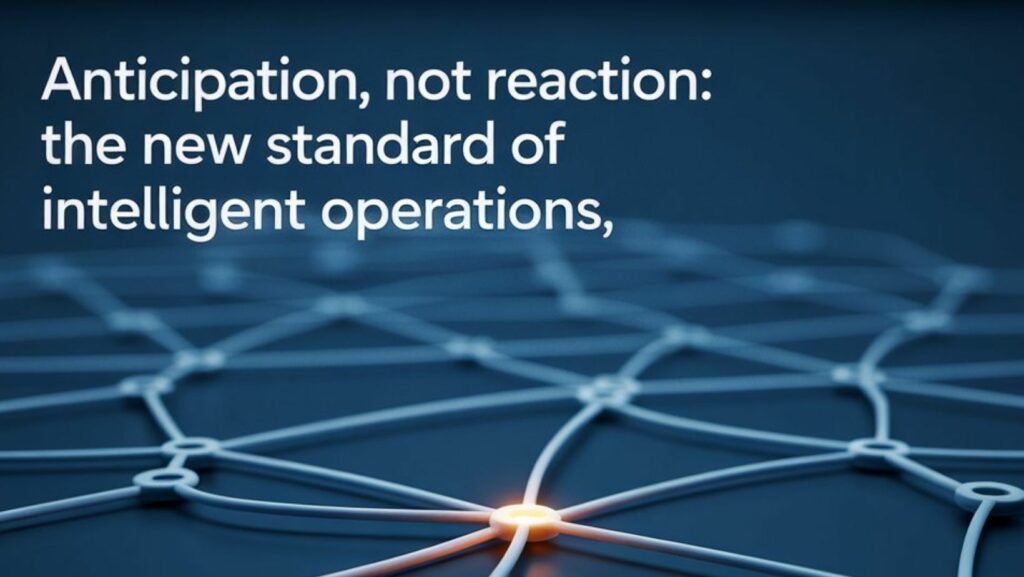Financial institutions and businesses today operate in one of the most complex environments in history. Markets move in milliseconds, customer expectations change overnight, and global events ripple instantly across portfolios and balance sheets. Traditionally, success in finance was measured by how fast organizations could respond to disruptions—adjusting strategies after risks materialized. But in a world where speed alone is no longer enough, the true advantage lies in anticipating challenges before they surface. The emerging standard is intelligent operations, where foresight and resilience outweigh reaction and repair.
Anticipation in the Financial Sphere
Intelligent operations in finance extend beyond automation or reporting. They are built on predictive models, real-time analytics, and adaptive systems that allow institutions to prepare for volatility rather than scramble in its wake. This is where we see clearly how businesses can benefit from agentic AI, as these autonomous systems are capable of scanning global data, simulating outcomes, and flagging risks before they become losses. Instead of simply reacting to a market crash, institutions can reposition assets earlier. Instead of waiting for fraud to be detected, they can prevent it at the first sign of irregularity. This shift represents not just a technological advantage, but a cultural one—placing anticipation at the heart of financial strategy.
The High Price of Reactivity
Reactive financial operations often result in preventable losses. A delayed response to currency swings, missed signals in loan portfolios, or late recognition of liquidity issues can quickly erode trust and profit. In banking, reacting too slowly to fraud leaves institutions vulnerable to reputational damage. In asset management, chasing trends after the fact often means missing the window for returns. These costs accumulate, creating instability in areas where precision is most critical.
An anticipatory model, however, uses forward-looking insights to shift from defensive maneuvers to offensive strategies. For example, predictive risk scoring can identify borrowers showing early signs of distress, allowing lenders to adjust terms or provide support before default occurs. Anticipation saves not only capital but also customer relationships.
Data as the New Currency
Financial markets generate oceans of data every second: transactions, trades, payments, and customer interactions. Intelligent operations treat this data as the lifeblood of foresight. By aggregating and analyzing it in real time, institutions uncover patterns invisible to manual processes.
Investment firms, for example, can detect early momentum shifts in sectors by analyzing trading volumes and sentiment indicators. Banks can anticipate liquidity shortages by studying cash-flow patterns across accounts. Insurers can model catastrophe risks with climate and demographic data, allowing for preemptive adjustments in underwriting. In every case, the proactive use of data reduces uncertainty and strengthens stability.
Automation with Financial Purpose
Automation in finance is no longer about replacing clerical tasks like reconciliations or transaction matching. Intelligent automation, guided by anticipatory principles, adapts dynamically to risk signals and market conditions. Payment systems can pause suspicious transfers in milliseconds. Trading algorithms can rebalance portfolios in anticipation of volatility. Compliance systems can flag potential breaches before regulators step in.
This type of purposeful automation ensures institutions stay ahead of both threats and opportunities, maintaining trust in a sector where confidence is everything.
Human Insight Meets Machine Precision
Anticipation in finance isn’t just about handing control to machines. While algorithms excel at crunching data and spotting anomalies, human expertise adds context, judgment, and ethics. The most resilient financial operations are those where AI tools surface early insights and professionals interpret them in alignment with broader business strategy.
A portfolio manager may rely on AI to forecast risk exposure, but it takes human judgment to balance returns with fiduciary responsibility. A compliance officer may use AI-driven alerts to monitor trading activity, but regulatory interpretation remains a distinctly human responsibility. Anticipation works best when machine precision and human wisdom reinforce each other.
Building Resilient Financial Systems
The financial sector has learned hard lessons about the dangers of relying solely on reactive models. The global financial crisis, sudden geopolitical shocks, and pandemic-driven disruptions all revealed how quickly vulnerabilities can cascade through interconnected markets. Intelligent operations aim to break this cycle by embedding resilience at the core.
Banks are now using predictive stress tests to evaluate resilience under multiple scenarios. Payment processors are building redundancies to anticipate spikes in digital transactions. Asset managers are diversifying portfolios with predictive scenario modeling. These measures ensure continuity and confidence even when uncertainty looms.
Enhancing Client Trust
In finance, client trust is currency. Intelligent operations elevate this trust by creating proactive client experiences. Rather than waiting for customers to raise concerns about suspicious charges, banks can alert them instantly. Wealth managers can propose investment adjustments before clients even notice market turbulence. Insurers can provide policyholders with preventative tips tailored to emerging risks.
Anticipatory service transforms client relationships from transactional to consultative, building loyalty in an industry where switching providers has never been easier.
Ethics and Governance in Predictive Finance
With great predictive power comes greater ethical responsibility. Intelligent operations must ensure that the use of data in finance remains fair, transparent, and compliant. Bias in lending algorithms, overreliance on opaque models, or lack of accountability in autonomous trading systems can undermine trust as quickly as they build it.
Forward-thinking institutions are now embedding explainability into AI models, ensuring clients and regulators understand how decisions are made. Ethical foresight is as critical as technological foresight, especially when livelihoods and financial well-being are at stake.
The Road Ahead for Finance
The evolution from reactive to anticipatory operations is not just a technological upgrade—it’s a strategic imperative for the financial sector. Those who embrace intelligent foresight will be better positioned to weather volatility, outpace competitors, and provide stability in uncertain times.

Agentic AI and predictive systems will only grow in sophistication, enabling real-time simulations of global risks and more nuanced financial planning. Firms that adopt these tools early will not only protect themselves but also redefine standards of excellence in banking, insurance, and investment.
Conclusion
Finance has always been about managing uncertainty, but the tools and strategies for doing so have fundamentally changed. Intelligent operations represent a paradigm shift: from reacting to yesterday’s problems to preparing for tomorrow’s opportunities.
By leveraging data, automation, and ethical governance, financial institutions can anticipate risks, strengthen resilience, and deliver proactive value to clients. In this new era, anticipation isn’t just a competitive edge—it’s the new standard of survival and success. Those who master it will lead, while those who remain reactive may struggle to stay relevant in an unforgiving financial world.

